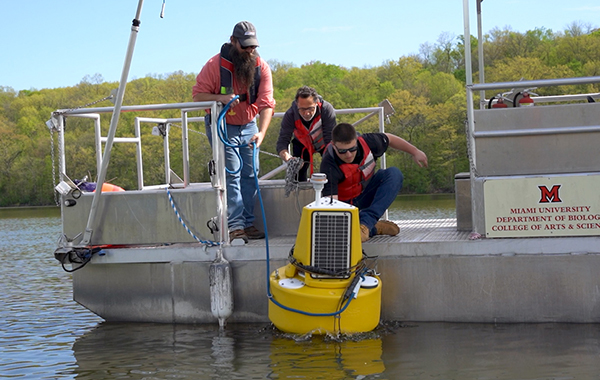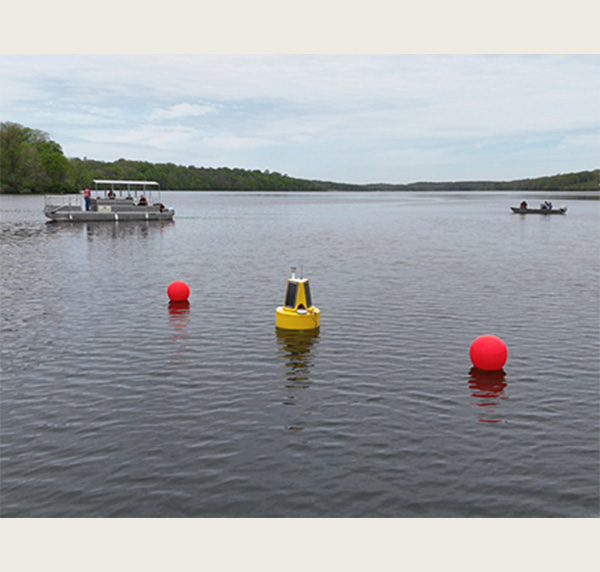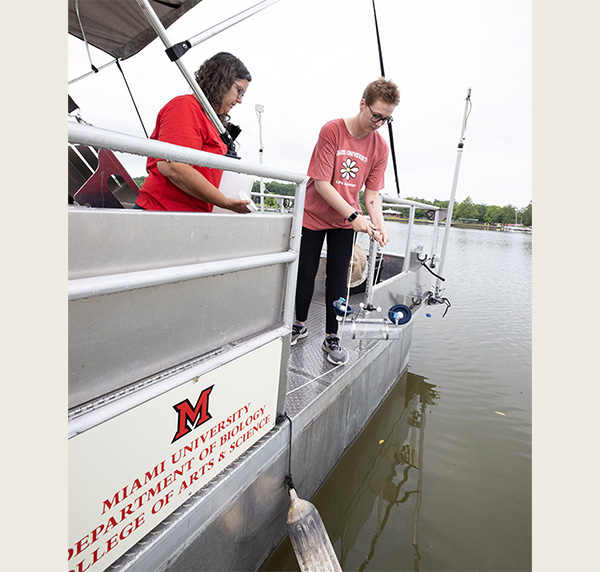Long-term aquatic research at Miami takes a team — and real-time data monitoring buoys
Watch the deployment of a new data monitoring buoy and learn about Miami research at Acton Lake in a video by NexSens Technology

Long-term aquatic research at Miami takes a team — and real-time data monitoring buoys
For more than 30 years, Miami University researchers and students have been studying water quality and ecosystem change at Acton Lake, a reservoir in Oxford, Ohio, and at Lakes Lacawac and Giles in northeastern Pennsylvania.
Lesley Knoll, assistant professor of Biology, and her students are involved in both research projects. Five other faculty members — from the departments of Biology, Geography, and Statistics — are principal investigators (PI) or co-PIs on the National Science Foundation-funded projects.
Miami’s Center for Aquatic and Watershed Sciences, directed by Bartosz Grudzinski, also supports the research. Data sensor technology is an integral part of the long-term, ‘big ecological data’ research.

We asked Knoll to tell us more about the new data monitoring buoy deployed at Acton Lake:
Knoll: “Sensors are increasingly useful for allowing us to capture events at a higher frequency or during times of the year when it is not safe to be on the lake. This is beneficial because some lakes, like those in our area of Ohio, do not form thick enough ice to safely trek out on. The past two winters, my lab at Miami deployed sensors on Acton Lake to help us see how biologically active the algae are.
We can download the buoy and weather data from the internet via a website. It's very handy to be able to do this. It also allows us to check that everything is working correctly and check the status of the lake in real time.
We still need traditionally collected data to supplement what the sensors can tell us. Sensors have progressed a lot over the years, but there are still many variables that are not quantifiable with a sensor, or the current cost of the sensor is prohibitive for most researchers.
The Center for Aquatic and Watershed Sciences (CAWS) manages the maintenance and data for these pieces of equipment. The new buoy at Acton Lake (deployment shown in the video below) does not give us new data compared to the old buoy it replaces, but it is more portable and easier to deploy in the field.
Acton Lake: 30 years and counting
Miami scientists have studied Acton Lake and its watershed for almost half of the reservoir’s 70-year existence.
Michael Vanni, University Distinguished Professor Emeritus of Biology and adjunct professor of Biology, is principal investigator of a team that recently received its fifth National Science Foundation (NSF) Long Term Research in Environmental Biology (LTREB) grant — nearly $640,000 — in support of long-term research at Acton Lake.
Co-PIs on the project are Maria Gonzalez, professor of Biology, Bartosz Grudzinski, associate professor of Geography and director of CAWS, Thomas Fisher, professor of Statistics, and Knoll.
More than 100 Miami undergraduate and graduate students have been involved with this research over the years.
Lake Lacawac and Lake Giles: Nearly 40 years of data
Knoll — an expert on working with long-term lake data — is leading another project at Lakes Lacawac and Giles in or near the Lacawac Sanctuary and Biological Field Station, located in the northern Pocono Mountain region.
Knoll and co-PIs Fisher and Jing Zhang, professor of Statistics, were awarded an NSF LTREB grant earlier this year for more than $257,110 to support this research. The research will extend a long-term data set of water quality variables sampled since the late 1980s.
Using a sophisticated suite of sensors, manually-collected long-term data spanning multiple decades, experiments, and ecosystem models, the research will help discern the consequences of lake browning and low dissolved oxygen availability in lakes. The project will support a regional lake monitoring network in Pennsylvania and closely interface with GLEON, the Global Lake Ecological Observatory Network.
Watch the video by NexSens Technology.

Staff and student research team members
Amy Weber, research associate in the Department of Biology, works with Vanni’s team on managing the day-to-day activities of the Acton Lake long-term research project.
- Alexandra Bros, master’s degree student in Biology with Knoll, is working on both the Acton Lake and Lakes Lacawac and Giles projects;
- Madison Miller, master’s degree student in Biology with Knoll, is working on the Acton Lake project;
- Anna Maki, rising junior Biology major and Environmental Science co-major, is an Undergraduate Summer Scholar working with Knoll on the Acton Lake research;
- Eden Carpenter-Waters, rising senior Biology major and Environmental Science co-major, is working with Vanni on the Acton Lake project, with Research Experience for Undergraduates ((REU) funds from the LTREB grant;
- Kate Halsey, rising junior Microbiology major and Premedical and Pre-Health Studies co-major, works part-time on projects with both Knoll and Vanni;
- Ethan Krekeler, rising junior Environmental Earth Science major and Sustainability co-major, is an Undergraduate Summer Scholar working with Grudzinski on the Acton Lake project.